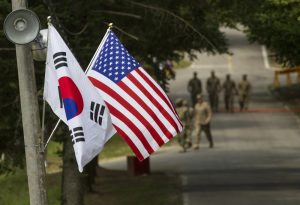Seoul and Washington said on February 5 that representatives in defense cost-sharing negotiations and officials from related ministries held the eighth round of the negotiations on the Special Measures Agreement (SMA). The two countries added that they would conclude the negotiations on sharing the defense cost of U.S. troops stationed in South Korea as soon as possible.
South Korea’s Foreign Ministry said it held serious discussions based on the spirit of the alliance to resolve the ongoing disagreements and reach a mutually acceptable agreement.
“I think the time when the National Assembly approves the ratification will come soon,” former Foreign Minister Kang Kyung-wha said in her final interpellation session at the National Assembly regarding the SMA.
Experts say new U.S. President Joe Biden’s drive to achieve peace and prosperity on the Korean Peninsula and Northeast Asia based on cooperation with allies is behind the rapid resumption of stalled SMA between the two countries.
The two countries resumed negotiations after an 11-month gap following the seventh round of SMA talks in Los Angeles in March last year. Notably, the recent round was the first meeting since the Biden administration took office. During the presidential campaign, Biden had criticized former President Donald Trump’s unilateral demand for allies to pay sharply increased defense costs. Experts expect the new administration to take a more measured approach to the cost-sharing question.
The U.S. and South Korean negotiating teams tentatively agreed in March 2020 to raise South Korea’s defense contributions by 13 percent but failed to reach a final agreement. At that time, the media reported that Trump had rejected the proposed agreement. The Trump administration demanded South Korea offer $5 billion a year toward the costs of hosting U.S. troops – more than five times the already record-high $900 million Seoul paid in the stopgap SMA that expired in 2019. Apparently Trump refused to budge from that astronomical figure, insisting that a wealthy country like South Korea should pay more. For Seoul, however, such a large hike was a “non-starter.”
Deadlock ensued, and the previous SMA expired – and with it, arrangements to pay the salaries of those employed at U.S. bases in South Korea. For the first time in history, 3,900 out of 9,000 South Korean employees in U.S. Forces Korea were forced into unpaid leave for nearly two months from April to June last year. The South Korean government and the National Assembly temporarily paid their salaries by enacting special laws and measures, amounting to about $200 million paid by the South Korean government.
Kim Young-jun, a professor at Korea National Defense University told The Diplomat that the Biden administration is likely to ask for increased defense costs in a much more sophisticated way than the Trump administration’s approach.
“The cost of stationing U.S. troops in Korea should be considered in various aspects, including the symbolism, contribution, and utilization value of the U.S. troops,” Kim said, adding that South Korea’s contributions to the defense costs are “not small compared to that of Germany and Japan.”
The details of the most recent negotiations have not been disclosed. However, when South Korea negotiated the SMA with the United States during the Obama administration, increased defense costs were calculated based on the inflation rate, with an upper limit of 4 percent. As the Biden administration includes many familiar faces from the Obama team, experts cautiously expect that the new U.S. administration offers a better chance to reach a deal with Seoul.
At the same time, local media reported that the two countries agreed that negotiating defense cost-sharing every year would not help the relationship between the two countries, so the two countries should do it on a five-year basis to maintain a stable alliance. Previous SMAs had covered five-year periods, but the Trump administration had demanded to revisit the issue every year after the initial SMA expired on December 31, 2018.
Along with the Biden administration’s clear pledge to restore relations with allies, some argue that the annual U.S.-South Korea joint military drills, usually scheduled in March, are the main reason for the resumption of negotiations.
Since 2018, South Korea and the United States have partially reduced or postponed their joint military exercises in order to continue denuclearization negotiations with North Korea. In his New Year’s press conference on January 18, South Korean President Moon Jae-in said that he could consult with North Korea, if necessary, regarding the resumption of the annual ROK-U.S. military drills in March.
More recently, Seoul’s new Foreign Minister Chung Eui-yong said that the joint military drills should continue but expressed skepticism about carrying out large-scale drills at his confirmation hearing last week.
However, the Biden administration has stressed the importance of the drills, arguing that North Korea’s nuclear ballistic missile program is a grave threat and that the joint drills are defensive exercises not meant to be provocative. Given the different perspectives over the military drills between Seoul and Washington, experts say there could be a conflict between the two when it comes to a decision on whether to conduct the joint military drills. Both sides, however, should put the national security of the South first.
“Since the purpose of the joint military drills is peace and stability on the Korean Peninsula, we should not put the cart before the horse,” Kim said. The Korea National Defense University professor added that the drills can be flexibly adjusted to match national security needs and their importance should not be overemphasized.
































